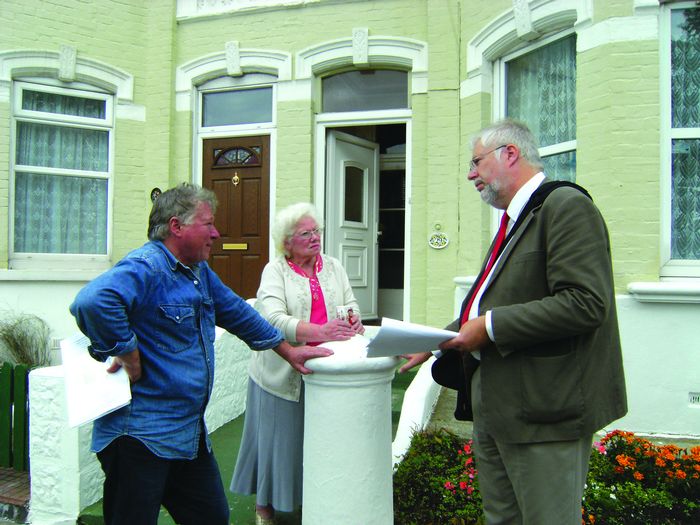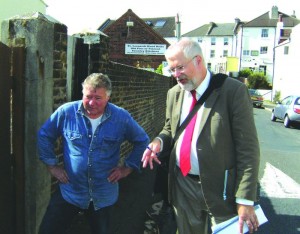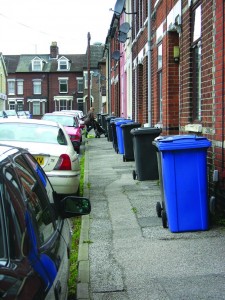St Peters Road and the Great Wheelie Bin Debate

Bill Third and Lydia Adams of St Peters Road in discussion with councillor Andrew Cartwritght SEE FULL STORY
Bohemia’s great twin bin debate continues. St Peter’s Road resident Bill Third met with Andrew Cartwright and has sent in a petition to the Council’s borough solicitor (see ‘Petition’ panel, this page) and to the head of waste & disposal (see ‘Green Bins’ panel, next page).
Anglesea Terrace resident Derek Cole has also been actively campaigning – since at least May of this year – and has now put a list of specific requests for information to the council (see panel, next page). We also give Andrew Cartwright’s letter in response to our article in last month’s issue (see panel, below). If you would like to share your views, please let us know .
ANDREW CARTWRIGHT writes (5 Sep 2008)
I read the article in the September Voice “St Peter’s Road petition” with interest. Last year the Conservative-led Council tried to introduce wheelie bins (twin bins) into many streets in Bohemia. The Council changed its position when local residents and opposition councillors (including myself) raised questions about the lawfulness of the process that the Council was following.
After taking legal advice the Council decided to remove a large number of streets from the scheme. The Council is now making a second attempt at introducing wheelie bins into some of those streets which were excluded last year. Whilst many residents in other parts of the town have welcomed wheelie bins and find them extremely easy to use it is undoubtedly true that they are not suitable for every household. If any resident feels that wheelie bins are being forced on them against their will then if they contact me I will do all I can to assist. Equally, if you would like a wheelie bin but you are not offered one then please let me know.
Of course, I am also willing to help any resident who has concerns about the introduction of communal bins. As last year showed, opposition councillors can sometimes be very effective.
Cllr Andrew Cartwright
BILL THIRD (Letter, sent Sep 5th 2008, from Bill Third to the Borough Solicitor, Jayne Butters)
“Dear Madam, please find enclosed a petition signed by representatives of 23 households in St Peter’s Road expressing their wish not to be included in the Twin Bin scheme for collection on Wednesdays as outlined in Colin Mee’s letter to residents of August 7th. The letter states that ‘rubbish will be collected from your point of storage’. For the majority of people, the point of storage is the back garden, and many households have long put their black bags outside their back gate for collection on a Tuesday in Cornfield Terrace.
The east side of St Peter’s Road is a continuous terrace with no side access to the dwellings. Houses are split level with internal stairs on the ground floor, thereby making it virtually impossible to move these large bins from ‘the point of storage’ in the back garden to the front of the property. Given the terraced row on the east side there is nowhere to store these bulky bins out of sight. The small front gardens are separated from paths by walls, hedges and fences so are unsuitable for storing bins. Quite apart from the fact that many people take considerable pride in their gardens and do not want them obscured by these bulky bins. Pathways are only 120 cm wide, so storing the 75 cm bins on them is not an option as it blocks access, for example in the event of fire. It would also block access to prams or buggies for those families with children, or indeed wheelchair access for the disabled. So there is simply no room for these at the front of the property.
The only alternative at the front would be to leave them on the pavement, which would restrict space for passage on the pavement by the many pram-pushing parents who walk up and down St Peter’s Road to bring or fetch their children from Christchurch School.
The overwhelming majority of residents on the east side have expressed their opposition to the proposed use of these bins, by signing this petition and would far rather stick with the current black bag system. The foxes and seagulls mentioned in Colin Mee’s letter are not really an issue here. The situation on the west side of St Peter’s Road is slightly different in that there are far fewer houses, most of them semi-detached, so that people have the space to tuck bins out of sight. But even here at least five residents are against.
Finally, there are at least four elderly and disabled householders who simply will not be able to deal with these bulky bins. To qualify for exemption or assistance, they will have to jump through hoops, fill in a form and obtain a doctor’s certificate. All in all this is a case of the recycling tail wagging the democratic dog.
The petitioners ask that the above objections are heard by the council cabinet at their earliest convenience.
Yours Sincerely, William A Third MA
BILL THIRD (extract from Bill Third’s letter, August 27, 2008, to Colin Mee, Head of Waste & Recycling at Hastings Borough Council)
“ … Regarding the green bin, this is totally superfluous for our household as we compost all our vegetable and organic waste and have done so for the last 11 years. Did anyone consider that quite a large number people now compost their waste when this ill conceived scheme was first considered? For a two person household such as ours, these bins are far too big.
You may be focussed on hitting your targets, but by doing so you will be hitting people instead. How are the old and infirm going to cope with them? Every month the European Parliament moves for a few days from Brussels to Strasbourg with all its documentation and members. This travelling circus, which is completely unnecessary, costs £200 million a year and emits 20,000 tonnes of carbon, equivalent to 13,000 round trips by air between London and New York.
It is they who should be subject to severe penalties, not local councils in the UK”.
William A Third MA
DEREK COLE (extracts from letter, 25 August 2008, from Derek Cole of Anglesea Terrace, to HBC’s Information Officer, considerably abridged)
- 1. Please supply detailed calculation of the increase, if any, in recycling, which will result from the proposed Communal Bin Scheme for Anglesea Terrace and Gensing Ward under the following heads: (1) paper, (2) glass (3) food (4) Plastic, cardboard, tins etc.
- 2. Please supply the outcome of any surveys done with reference to the health hazard caused by ‘gulls and foxes’ actually recorded in Gensing Ward.
- 3. Please indicate the yearly amount (if any) which will benefit each council tax payer to offset the yearly rise in council tax. Does the calculation include the cost of cleaning the communal bins, and depreciation cost?
- 4. Please give any legal reasons which might require a switch from the present system to communal bins. Please give details of any Government policy which might compel a switch from the present system to communal bins. How long will the Council be legally committed to any such scheme?’.
- 5. Please say if it is intended or not to set up an all- party Scrutiny Committee to study the options.
- 6. Please outline the decision-making process which will decide if (a) Anglesea Terrace and (b) Gensing Ward will be included in any new scheme.
- 7. How many parking spaces are expected to be lost?
- 8. Please answer the question ‘If it ain’t broke, why fix it?’ Please include copies of any document laid before cabinet or other elected councillors explaining the advantages of changing from the current system.
PETER WINDER writes (Dec 2008)
Dear Sir, I enjoyed the article in Voice about the wheelie bin dispute. There is a street in Ipswich where you can hardly pass along a narrow pavement because the occupants of a terrace of Victorian houses all have to keep their bins on the path. In Germany groups of houses tend to have communal bins locked in little sheds. In Bologna they have large wheelie bins just left in the street among the parked cars and anyone uses them. This morning I’ve been prowling the back streets of Ipswich with my camera concealed under my brown raincoat and send a photo for your publication.
Peter Winder, Manningtree, Essex.
MARK CURRY writes (Jan 2009)
Dear Sir, re the faulty information packs about communal bins being sent to 538 households in Bohemia. It seems remarkable that the task of putting 3 documents and an envelope inside another envelope is simply beyond the wit of the Hastings Borough Council. What I find even more appalling is that Emmett Dunford, Waste & Recycling Project Manager, does not even have the decency to apologise for this stupid error in his email to our elected representatives. HBC is one of the worst public sector organisations I’ve come across. Although it does seem highly effective at wasting public money.
Mark Curry, St Peters Road.
WILLIAM PAIGE writes (Jan 2009)
Dear Sir, do we really want communal bins in Blomfield Road? The Council says “recycling levels are far too low”, but they give absolutely no evidence for communal bins making recycling easier … why should it? Recycling is as much a question of education as of more facilities. They also say “severe amounts of hazardous rubbish are regularly strewn across the streets”. We know this sometimes happens here on the day of collection but those who walk down Church Road and Warrior Gardens, past the communal bins, will be all too familiar with the rubbish strewn by the bins, seven days a week.
Do we really want this in Blomfield Road? The bins are very unsightly and lower the general tone of the area. They attract flies and vermin, especially when overfilled, when the lids cannot be closed. One wonders what the Council’s real agenda is. If it is cost reduction, it is hard to believe this will be achieved if the bins have to emptied six times a week. Could not the Council provide stronger, easily sealable black bags at less cost?
William Paige, Blomfield Road.
ANDREW CARTWRIGHT and KIM FORWARD write (Jan 2009)
Dear Sir, we have many concerns about the communal bins project. It is designed to meet the needs of the Council. The Council has chosen not to work in partnership with residents, but instead to “consult” with them on the basis of a form which we feel is designed to encourage residents to support the scheme rather than to understand it. We believe that residents should take action now to protect Bohemia.
Working parties A possible way forward would be to organise two working parties, one to examine closely the pros and cons of the communal bin system, and another to write an outline proposal for a system based on small containers and/or wheelie bins with or without communal bins. The Council is already considering an alternative scheme for Cornfield Terrace. Ideally the working parties would need to comprise local residents plus their elected representatives and council officers. However, council officers may not be able to participate as this would require the approval of the Conservative Cabinet. In this case then we would suggest that residents and councillors proceed together.
- Consultation The consultation has been chaotic. There have been several major errors in the mail-out of consultation documents. Council management has no process in place which enables it to say with certainty whether or not there are undiscovered errors. Analysis of the consultation will be problematic owing to the need to process returns from residents who have received the wrong information. We are very concerned about the public perception of the consultation, in particular, whether or not residents regard it as being safe. It appears that “incorrect” returns will be indistinguishable from those which have received the correct information.
- Siting of bins Insufficient consideration has been given to the impact on those residents who will be living close to the communal bins. There are concerns that front gardens would become unusable, resident’s sleep would be disturbed and sacks of rubbish would be left on the road and pavement instead of being placed in the bin leading to attacks from scavengers and increased street litter near the bins.
- Assisted collections No information has been supplied on “assisted collections” for residents who will be unable to put their refuse to the communal bins.
- Parking Siting of 48 communal bins in Bohemia will place significant pressures on parking and possibly damage the local economy.
- Recycling Insufficient consideration has been given to the need to increase rates of recycling. The Council has assumed fly-tippers will leave their refuse by the bins and thereby not contaminate the recycling. Because there cannot be any thorough check on the contents of a bin there is a risk that entire lorry-loads of recycled material will have to be diverted into the residual waste stream. This will be damaging environmentally.
- Traffic Siting communal bins could interrupt the traffic-flow on Bohemia Road. Altogether, twelve of the bins would be located on busy main roads (Bohemia Road and London Road). Some of these sites are in places where vehicles left for a few minutes on the road already interrupt the traffic flow.
- Communities The Council has not taken social factors, such as the make-up of the community, into account. For example, there has been no consideration given to the differences between settled and transient communities and how these differences impact on not only the needs of the Community but whether any particular set of proposals is likely to work.
- Cornfield Terrace This road was intentionally shown on the map as being included in the Communal bin scheme even though it is not included. The Council’s explanation is that “ … it would have been difficult to remove individual streets from the shaded areas and would have made the map look messy.”
- Brighton & Westminster The Council’s view is that communal bins “are already working incredibly well in Brighton, Westminster and other major parts of the country.” In Brighton the scheme has only recently been introduced (save for a trial) and it is too early to say whether or not it is a success. The Council says “The communal bin scheme in Brighton currently serves 6,000 households and the Council has just approved the extension of the scheme to cover a further 20,000 households. It would be fair to assume that they would not have chosen to do so if it had not been successful.” However, the trial area covered streets believed to be well suited to the scheme, mainly large multi-occupancy houses (flats and bedsits) – similar to Warrior Square, not Bohemia. We can find no evidence of any similar scheme in Westminster.
- Edinburgh & Aberdeen Similar schemes operate in Edinburgh and Aberdeen. However, the Edinburgh scheme has had major operational problems. The ‘Edinburgh Evening News’ reported that four out of five of the refuse freighters broke down in 2005 leaving very large amounts of refuse on the streets. Freighters were borrowed from Aberdeen to resolve the problem. More research is required to ascertain how well communal bins of this particular type work elsewhere in the U.K. Although foreign systems are an invaluable source of ideas, close comparisons between Hastings and foreign towns are not appropriate as there are significant differences in culture and law.
Cllr Andrew Cartwright and Cllr Kim Forward.
Leave a Response
You must be logged in to post a comment.



